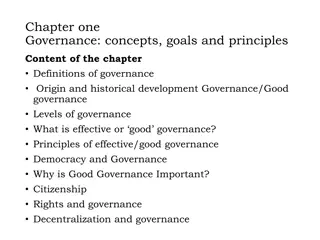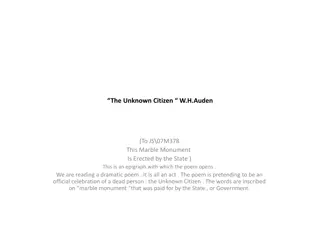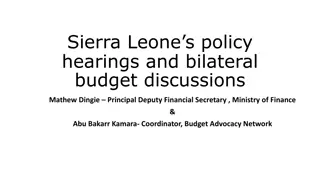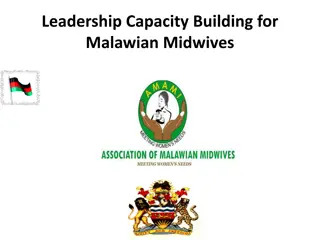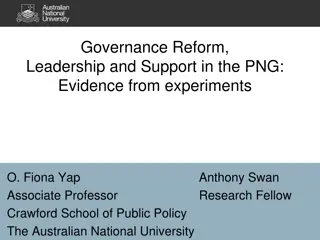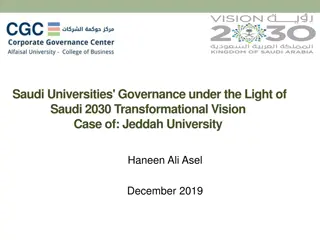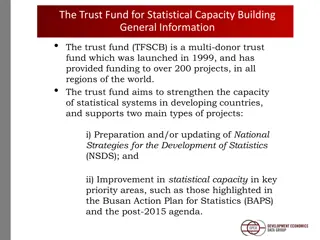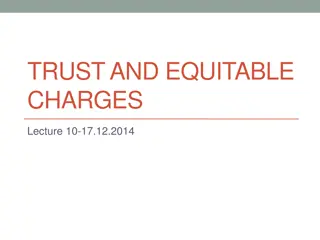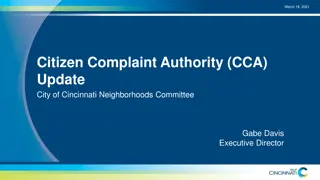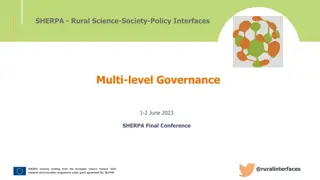Examining Citizen Trust in Malawian Governance Over Two Decades (1999-2019)
This paper critically analyzes public trust in key government institutions in Malawi from 1999 to 2019, highlighting a general decline in trust levels and its impact on political legitimacy. The study explores factors influencing public trust, such as perceptions of government performance, integrity, and corruption. By utilizing Afrobarometer data sets, the research underscores the significance of citizen trust in promoting good governance and democracy.
Download Presentation

Please find below an Image/Link to download the presentation.
The content on the website is provided AS IS for your information and personal use only. It may not be sold, licensed, or shared on other websites without obtaining consent from the author. Download presentation by click this link. If you encounter any issues during the download, it is possible that the publisher has removed the file from their server.
E N D
Presentation Transcript
TWO DECADES OF GOVERNANCE IN TWO DECADES OF GOVERNANCE IN MALAWI: EXAMINING CITIZEN TRUST MALAWI: EXAMINING CITIZEN TRUST IN MALAWI FROM 1999 IN MALAWI FROM 1999- -2019 2019 Joseph J. Chunga and Happy Kayuni University of Malawi 15thDecember 2021 Malawi-Scotland Governance Webinar
Presentation Outline 1 Pre and post 1994 Malawi Introduction Aim of the paper 2 The Concept of Governance & Political Trust Definition of Political Trust and Governance Consequences of Political Trust Brief Background to Governance in Malawi Key issues affecting in the pre and post 1994 period 3 4 General Trends of Trust in Presidents, Parliament, Police and Courts from 1999 to 2019 Trends from 1999 to 2019 The significant exceptions 5 Possible explanatory factors, Consequences & Conclusion Explanatory factors and consequences of political trust Conclusion
Introduction The aim of this paper is to critically examine trajectories of public trust in key government institutions (parliament, courts, the presidency and the police) from 1999 to 2019. Explore factors that affect public trust, and implications on state legitimacy and prospects of democracy. Choice of these state institutions: The three arms of government and police because it was an epitome of state force under one-party rule. Increasingly, contemporary political governance studies are acknowledging the role of citizen trust in good governance. Public trust has critical implications on the long-term legitimacy and democratic consolidation of any polity. The success or failure of government policies and programmes largely depends on the trust that respective public institutions enjoy (Kotze and Garcia Rivero2017). The post-1994 constitution specifically stipulates that authority of all state institutions is based on sustained trust of Malawians.
Using mainly Afrobarometer data sets and reviews. The paper argues that there is a general decline in public trust of key governance institutions; that this decline is related to government performance and integrity; and that is has had effect on political legitimacy. The key possible explanatory factors to the declining levels of trust: Perceptions of government handling of food challenges, Perceptions of government management of economy (or general performance) and Levels of corruption. The identification of these possible explanatory factors was guided by the observations made by public trust studies done by Ramesh and Mattes and Moreno.
Governance and Political Trust Political trust is defined as the ratio of people s evaluation of government performance relative to their normative expectations of how government ought to perform (Hetherington and Husser 2012:313). It is an expression of people s confidence in political institutions or political leaders. According to Miller and Listhaug (1990: 358) political trust is akin to the judgment of the citizenry on the political system and its leadership. Empirical studies have shown that low levels of political trust are associated with less law compliance within a society. It produces a political environment in which political leaders find it difficult to successfully lead or implement policies or even win an election (Hetherington 1998). Political trust is core to and has direct implications on good governance. Ramesh (2011:267) who points out that: Citizen trust in public institutions is an indication of successful governance as it has often been viewed as an important element of good governance. Citizen distrust in government and its institutions considerably affects the effectiveness and efficiency of public policies and their implementation Higher the citizen trust in public institutions ensures good governance and successful implementation of policies (Ramesh, 2011:267)
Governance in this context and this paper is defined as: the provision of the political, social and economic public goods and services that every citizen has the right to expect from their state, and that a state has the responsibility to deliver to its citizen (MIF 2019). The concept of good was later added to governance mainly to express a desired value of governance. Indicators that this paper uses are related to the World Bank and UNDP s indicators such as: political accountability, freedom of association and participation, rule of law and independence of the judiciary, bureaucratic accountability, freedom of information, a sound administrative system, partnership between the government and the civil society organizations .
A Brief Background to Governance in Malawi A Brief Background to Governance in Malawi From independence in 1964 up to 1994, Malawi s governance system revolved around an individual, Kamuzu Banda. The presidency dominated parliament and any other policy making and governance institution in the country The re-introduction of multiparty system of government in 1994 provided an opportunity for a renewed democratic political system. Specifically, there was a proper legal and political platform established to ensure meaningful participation of citizens in the development agenda of the country.
General Trends of Trust in Presidents, Parliament, Police and Courts General Trends of Trust in Presidents, Parliament, Police and Courts from 1999 to 2019 from 1999 to 2019 With minor exceptions, the trends from 1999 to 2019 shows that there has been a general decline in the level of trust (a lot or somewhat) for all institutions. It is interesting to note that all institutions received increasing approval or trust between 1999 and 2005. The general reduction mainly started around 2008 to the present. The significant exceptions are with the office of the presidency and courts. The office of the president has witnessed a substantially significant reduction in trust from 79% in 2008 to 29% in 2014 followed by another increase to 36% and 43% in 2017 and 2019 respectively. 90% 80% 70% 60% 50% 40% 30% 20% 10% 0% 1999 2003 2005 2008 2012 2014 2017 2019 President 50% 48% 60% 79% 57% 29% 36% 43% MP 38% 51% 54% 64% 50% 40% 46% 35% Police 42% 64% 79% 69% 68% 60% 53% 31% Courts 47% 61% 78% 74% 81% 71% 59% 68%
Possible explanatory factors Possible explanatory factors Levels of corruption When the data of respondents who perceived the existence of corruption for specific institutions is compared to their perception of trust for the same institutions, it suggests that there is a relationship. The higher the perceived perception of corruption for a specific office/institution, the lower is the trust for the same. The paper agrees with other studies which attributed higher levels of corruption to loss of citizenry trust. Government handling of food challenges, management of economy and general performance When the data (2003 to 2019) of respondents perception on government handling of some of the most important problems facing the country(food challenges and management of the economy) are analysed in relation to their perception of trust for the office of presidency, it shows that there is a positive relationship. The high the proportion of people felt that the government had handled well food challenges and management of the economy, the higher the proportion of those that trusted the office of the president and vice versa. For instance, between 2003 and 2008, there was an increase of 37% for respondents who felt that the government's handling of the economy was good and in the same period, trust of the office of the presidency also increased by 31%. Likewise, trust in the office of the presidency significantly declined (by 50%) between 2008 and 2014 while the perception of the government handling of food security and managing the economy also declined by 15% and 38% respectively over the same period.
Consequences of (loss of) citizenry trust: Implications on state Consequences of (loss of) citizenry trust: Implications on state legitimacy and prospects for democracy) legitimacy and prospects for democracy) Declining support for elections as a method of choosing political leaders Data from 2003 to 2019 shows that there is a general rise in people who think we should choose leaders through other methods than elections because elections produce bad results. Decline in support and satisfaction with democracy Data from 1999 to 2019 shows that support for democracy (democracy always preferable to other forms of government) and satisfaction with how democracy is working in Malawi are also on the decline. On obeying the law and on courts making binding decision In relation to trust in the police and legitimacy of the police to enforce people s obedience to the law, the proportion of respondents who believe the police have the right to ensure that people always obey laws significantly declined in 2017 and this also matched with the loss of trust in the same year. Respondents who mentioned that people hold police legitimacy to enforce laws when matched with their level of trust in the police the results shows a decline from 84% in 2014 to 51% in 2017 and trust in the police declined from 60% in 2014 to 53% in 2017.
Conclusion The Afrobarometer survey results show that from 1999 to 2019 Malawi has faced significant decline in trust of key governance institutions. This is especially the case from 2008 following a general positive trend between 1999 and 2008. Also a growing number of people are losing trust in elections as a method of choosing leaders and there is a general decline in support and satisfaction with democracy. Thus some key explanatory factors or issues that need to be seriously considered if trust has to be restored include: improving the anti-corruption drive, need for the government to effectively handle food challenges, management of the economy and government to effectively handle general public performance.









